Fewer than 1,000 name changes were approved in 2019 by the ministry of justice – 985 to be exact, or 103 fewer than in 2018.
Anyone wishing to change their family name has to apply to the ministry for approval before the new name can be logged in the national population register. The number of applications was 1,317, or 8% less than in 2018. Of those, 700 applications were approved affecting 985 people – since one name change can affect various members of a family.
At the same time, 243 name change applications were rejected. “A change of family name is not a right, but a favour,” commented a spokesperson for the ministry. The request has to be based on “serious reasons” – one of the main researches done by the ministry is to consult the person’s criminal record, if any, to ensure the change is not to avoid the legal authorities.
One of those serious reasons is the desire of a previously married woman who has taken her husband’s name to revert to her maiden name. In other cases, naturalised Belgians whose family name is difficult to pronounce for other Belgians have been approved for a change. In some cases, the change is being made because the applicants shares their name with a dictator or other notorious figure, such as a criminal. Members of the family of a criminal, among them the relatives of serial killer Marc Dutroux, have also been allowed to change their name.
Finally, name changes can be approved if the ministry agrees that the current name is a possible subject of ridicule.
Legally, each name change approved by the ministry is the subject of a Royal order, published in the government’s official journal, the Belgian Monitor. An application to change a family name requires payment of €140 deposit, which is not refunded if the application is refused. Since 2018, changing a first name is done at the commune where he person is registered. A special procedure, also via the commune, is reserved for transgendered people whose first name does not correspond to their expressed gender.
Alan Hope
The Brussels Times

